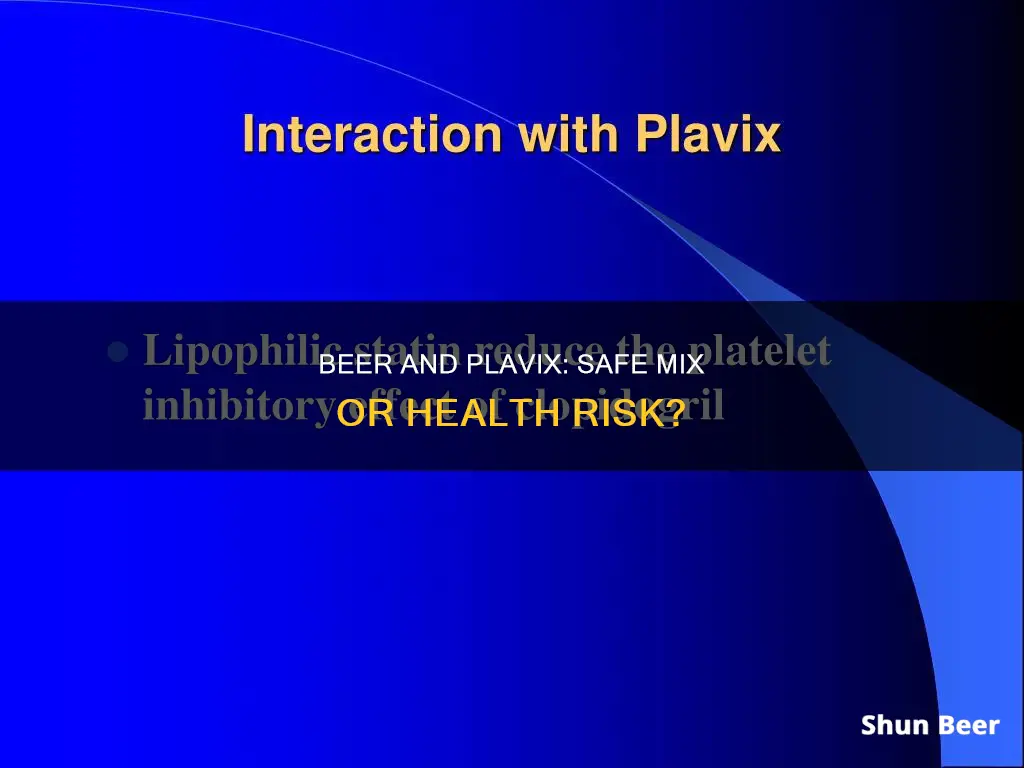
Plavix (clopidogrel) is a prescription drug used to reduce the risk of heart attacks and strokes in adults. It is known to interact with some drugs and supplements, such as omeprazole and esomeprazole. While there are no known interactions between Plavix and alcohol, consuming large amounts of alcohol while taking Plavix can increase the risk of certain side effects, such as internal bleeding. Experts generally advise caution when drinking alcohol with Plavix, and recommend not exceeding the maximum recommended weekly alcohol intake of 14 units.
| Characteristics | Values |
|---|---|
| Can you drink beer if you take Plavix? | Yes, in moderation. However, drinking alcohol while taking Plavix can increase the risk of certain side effects, such as bleeding. |
| What is Plavix? | Plavix (clopidogrel) is a prescription drug used to decrease the risk of heart attacks and strokes in adults. |
| How does Plavix work? | Plavix is an antiplatelet medicine that prevents blood cells called platelets from sticking together and forming blood clots. |
| What are the side effects of Plavix? | The main side effect of Plavix is increased bleeding, which can include nosebleeds, heavier periods, bleeding gums, and bruising. Other side effects include indigestion, heartburn, and stomach irritation. |
| What should I do if I experience side effects from Plavix? | If you experience any side effects from Plavix, consult your doctor or pharmacist. |
| Can I drink alcohol if I take other medications? | It depends on the medication. Alcohol can interact with many medications, including blood thinners and antiplatelet drugs. It is important to consult your doctor or pharmacist about the specific medications you are taking. |
What You'll Learn

Plavix and alcohol
Plavix (clopidogrel) is a prescription drug used to lower the risk of heart attacks and strokes in adults. It is not known to have any direct interactions with alcohol. However, consuming large amounts of alcohol while taking Plavix may increase your risk of certain side effects.
Plavix works by reducing the blood's ability to clot, which can be useful in preventing heart attacks and strokes caused by blood clots. However, this also means that Plavix increases your risk of bleeding. Drinking alcohol in large quantities can also increase your risk of bleeding, especially in the stomach, as alcohol can cause gastritis (inflammation of the stomach lining) which can lead to bleeding. Therefore, combining Plavix with excessive alcohol consumption may further increase your risk of bleeding.
It is important to note that the combination of Plavix and alcohol can also alter the effect of platelets and increase the risk of bleeding without affecting the INR, a measure of Plavix's effect. Platelets are blood cells that play a crucial role in forming blood clots. By inhibiting the function of platelets, Plavix helps prevent blood clots but also increases the risk of excessive bleeding.
Additionally, alcohol can interfere with how Plavix works in the body. Alcohol can alter the time it takes for your body to break down Plavix, affecting its efficacy and dosage. If your body has not fully processed the last dose of Plavix, taking another dose may lead to an excessive amount of the drug in your system.
To minimise the risk of side effects, it is recommended to consume alcohol in moderation while taking Plavix. According to the Dietary Guidelines for Americans, moderate drinking is defined as up to one drink per day for women and up to two drinks per day for men. It is also important to consult your doctor before consuming alcohol if you are taking Plavix, as they can advise you on the safe amount to consume while on this medication.
Old Beer: Is It Safe to Drink?
You may want to see also

Plavix and internal bleeding
Plavix (clopidogrel) is a prescription drug that helps prevent cardiovascular events such as heart attacks and strokes in adults. It is an anti-platelet medicine that prevents platelets from sticking together and forming blood clots. While this is beneficial for preventing cardiovascular events, it also means that Plavix can increase the risk of internal bleeding.
Internal bleeding is a known side effect of Plavix. It can occur anywhere in the body, including the brain and gastrointestinal system. Symptoms of internal bleeding include altered mental state, severely low blood pressure, and blood in stool or urine. If you suspect internal bleeding, seek emergency medical attention.
The risk of internal bleeding is further increased when Plavix is combined with other substances, such as alcohol, nonsteroidal anti-inflammatory drugs (NSAIDs), and blood thinners. Consuming large amounts of alcohol while taking Plavix can increase the risk of gastritis, which can lead to bleeding in the stomach lining. NSAIDs, such as ibuprofen, and blood thinners, such as warfarin, can also increase the risk of bleeding when taken with Plavix. Therefore, it is important to consult a doctor before consuming alcohol or taking any other medications or supplements while on Plavix.
In addition to internal bleeding, Plavix has also been linked to other serious complications, including acute hemorrhage, stomach ulcers, and thrombotic thrombocytopenic purpura (TTP). TTP is a condition where blood clots form throughout the body, including in small blood vessels, which can lead to purple or discolored spots on the skin or inside the mouth.
If you experience any signs or symptoms of internal bleeding or other complications while taking Plavix, it is crucial to seek medical advice and consult your doctor. They can advise you on the best course of action and recommend alternative treatments if necessary.
Beer and Injections: What's Safe to Drink?
You may want to see also

Plavix and surgery
Plavix (clopidogrel) is a prescription drug used to reduce the risk of heart attacks and strokes in adults. It works by making it harder for the blood to clot. While Plavix does not have any known interactions with alcohol, consuming large amounts of alcohol can increase the risk of stomach inflammation and bleeding, which is a known side effect of Plavix. Therefore, drinking alcohol while taking Plavix may further increase the risk of bleeding.
If you are scheduled for surgery, it is important to inform your doctor if you are taking Plavix, as it can increase the risk of bleeding during and after the procedure. In some cases, your doctor may recommend stopping Plavix before surgery to reduce the risk of bleeding. However, it is important to note that discontinuing Plavix can also increase the risk of thrombosis, especially if you have a stent.
The decision to continue or discontinue Plavix before surgery depends on several factors, including the type of surgery, the risk of bleeding, and the presence of other medical conditions. For example, if the surgery is expected to result in excessive blood loss, your doctor may advise discontinuing Plavix temporarily. On the other hand, if you are at high risk of thrombosis, your doctor may recommend continuing Plavix to prevent blood clots.
It is crucial to consult with your doctor or healthcare provider before stopping or starting any medication, including Plavix, especially if you are scheduled for surgery. They will be able to assess your individual situation and provide personalized recommendations to ensure your safety during the surgical procedure.
Fireball and Beer: A Safe Mix?
You may want to see also

Plavix and pregnancy
Plavix (clopidogrel) is a prescription drug used to lower the risk of heart attacks and strokes in certain adults. It is unclear whether it is safe to take Plavix during pregnancy. Animal studies have not found evidence of impaired fertility or harm to the foetus, and there is no evidence from human studies of an association with major birth defects, miscarriage, or adverse fetal outcomes. However, there are no controlled data in human pregnancy, and the use of this drug during labour or delivery can increase the risk of maternal bleeding and haemorrhage. Therefore, it is recommended to discontinue the use of Plavix 5 to 7 days before labour or delivery.
If you are pregnant or planning to become pregnant, it is important to consult your doctor before taking Plavix. They can advise you on the risks and benefits and discuss alternative treatments.
Beer Mail: Shipping Alcohol Straight to Your Doorstep
You may want to see also

Plavix and breastfeeding
While there is no published information on the use of Plavix during breastfeeding, the manufacturer reports no adverse effects in a small number of cases. However, due to the lack of published data, an alternate drug is often preferred, especially when nursing a newborn or preterm infant. If Plavix is used during breastfeeding, the infant should be monitored for bruising and bleeding.
Plavix is a prescription drug used to lower the risk of heart attacks and strokes in certain adults. It is not known if Plavix passes into breast milk or what effects it may have on a child who is breastfed. Therefore, it is important to consult a doctor about the safety of taking Plavix while breastfeeding.
Plavix has several known interactions with other drugs and supplements. For example, omeprazole (Prilosec) and esomeprazole (Nexium) can make Plavix less effective. Nonsteroidal anti-inflammatory drugs (NSAIDs), such as ibuprofen (Advil) and aspirin, can increase the risk of side effects when taken with Plavix. It is important to disclose all medications, supplements, and vitamins to a doctor or pharmacist to prevent possible interactions.
Additionally, consuming large amounts of alcohol while taking Plavix can increase the risk of certain side effects, such as bleeding. Alcohol can limit the liver's ability to metabolize compounds and the kidneys' ability to excrete toxins and drugs. Therefore, drinking alcohol while taking Plavix may further increase the risk of bleeding. It is recommended to consult a doctor about the safe amount of alcohol consumption while taking Plavix.
The Working of Beer Cup Filling Stations Simplified
You may want to see also
Frequently asked questions
Yes, but only in moderation. Drinking too much beer while taking Plavix can irritate your stomach and increase your risk of bleeding.
Plavix (clopidogrel) is a prescription drug used to decrease the risk of heart attacks and strokes in adults.
The main side effect of Plavix is bleeding more easily than normal. You may experience nosebleeds, heavier periods, bleeding gums, or bruising.
Yes, Plavix has interactions with some other drugs and supplements, including omeprazole (Prilosec) and esomeprazole (Nexium). It is important to tell your doctor about any other medications you are taking before starting Plavix.
If you experience any side effects from Plavix, talk to your doctor or pharmacist. They can advise you on how to manage the side effects or adjust your treatment plan if necessary.







